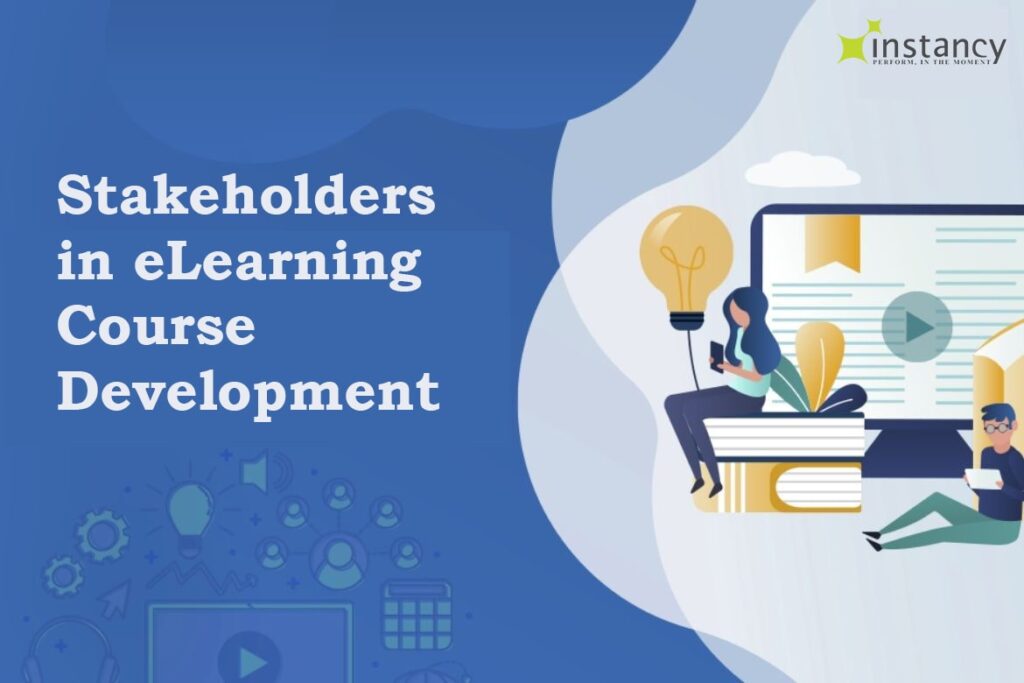The ideation, conception, and finally the deployment of an eLearning course on the digital platform, is made possible by a highly specialized team. A strong work ethic and seamless collaboration are the essential hallmarks of an effective eLearning project. The stakeholders in an eLearning course development process play a pivotal role in setting up priorities and objectives to ensure the appropriate relevance of projects and programs.
As a direct beneficiary of the initiative, they are committed to the successful outcome of the project, while keeping in mind a return on the investment.
Stakeholders lend clarity to the prerequisites of a training program and direct the team towards fulfilling the same. They have to be convinced about the desired outcome of the training program. It is this conviction that trickles down to the entire team and seamlessly binds the team towards a common goal.

Stakeholders in an eLearning Course Development Process
Here is an overview of the key players involved and the teamwork that takes an idea to fruition.
1. Project Manager
The onus of the overall day-to-day operations of the team lies with the project manager. The smooth execution, monitoring, controlling, and closure of the project fall within their purview.
The prerequisites of a project manager are manifold. Exemplary planning and execution skills with the ability to meet deadlines and a keen sense of management skills are mandatory. In case of a problem the project manager either takes it upon himself or discusses possible solutions with the team to fix the problem. They are pretty much the captain of the ship and ensure the focus of the entire team is towards a common goal.
2. Subject Matter Experts
Subject matter experts are sought out to lend their unique expertise to make the course interesting and relevant. They are expected to lay the foundation of the training that is being conceived.
An SME ideally works backward from the training goal to the training content. In a nutshell, they set the foundation for a meaningful learning experience. In the capacity of a subject matter expert, direct interaction with every member of the team is inevitable, hence effective communication and collaborative skills are important.
3. Learning Design Experts or Instructional Designers
Besides designing storyboards and courses in tandem with subject matter experts, the design expert’s insight of learner needs, and requirements, are leveraged to successfully deliver what is essential.
Deliberate choices about what, when, where, and the method of teaching, is the broad framework of learning design. The instructional designer makes decisions about the content, strategies, structure, sequence as well as the nature of the technology that will be used to support the learning.
4. Multimedia Designers
These are the people who make the course visually appealing. Just plain text on screen can be very boring to go through and can fail to engage the learner. A visual that complements the text or explains the concept in a pictorial format can ensure learner retention.
It is the job of the multimedia designer to ensure the course is designed as per the branding guidelines of the organization and can be viewed on various devices. What the instructional designer writes in the form of text is what the multimedia designer adds to in the form of a visual.
5. Authoring Tool Experts
An authoring tool allows you to present the content designed by the instructional designer. Existing content can be repurposed and legacy resources converted using the tool as well.
Both audio and video editing for courses is handled by an authoring tool expert. They integrate content within the course layout, to ensure compatibility of the course with the LMS, and then add finishing touches to boost the effectiveness of the course.
6. Technology Experts
Post design and creating a program, the course must be hosted on a learning platform. Accessibility to a course across geographical boundaries, locations, and on the devices within the learner’s reach requires the expertise of these technicians.
Existing courses can be made SCORM, AICC, and xAPI compliant. Often the authoring tool experts are the technology experts as well.
7. Translators
Investing in translation boosts product visibility over a broader spectrum. A machine-generated translation is often poorly constructed, and the target viewer will find the message indecipherable. Translations are best handled by someone who understands the target market, with a sense of cultural understanding of phrases and terms, thereby lending relevance to the content.
8. Narrators/Voice Over Recording Artists
Narrators lend the audio narration to the course. A crisp, clear pronunciation, language expertise, and experience in recording, with impeccable voice modulation can go a long way in lending quality to a course. A narrator lends life to the eLearning content, forging an emotional connection with the learners for maximum retention.
9. Quality Assurance Specialist
Navigation errors, missing links, multimedia file issues, typos, and any other unnecessary elements are kept out of the final eLearning course deliverable, by the quality assurance team. Numerous quality assurance tests are conducted to verify the eLearning course from text to multimedia elements and scenarios.





